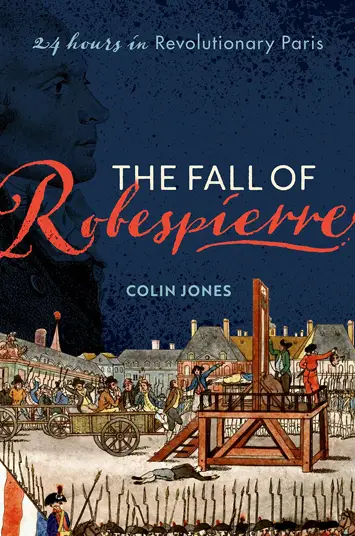The Fall of Robespierre by Colin Jones – Review

By Sandra Callard
This huge and scholarly book by historian Colin Jones focuses in acute detail on the final hours of Maximilien Robespierre, the architect of the French Revolution. Robespierre was a lawyer who campaigned for the abolition of slavery, the abolition of celibacy for the clergy, and the right for citizens to carry arms for defence. He was also the architect of the Revolution itself and pressed for the guillotine to become the main cause of execution for traitors of the Revolution. He fully believed in the authenticity of ‘The Terror’, as the Revolution became known, as an instrument that would turn France into a new republic.
The late eighteenth century was a time of growing dissent amongst the French populace at large, which culminated in the huge seismic shift that became the French Revolution. Life was hard for the French people, particularly those living, or just existing, in a Paris ruled by a king who was blinkered to the growing unrest around him. When it did become apparent to King Louis XVII that he was in danger, he, his family and his court tried to escape abroad but were captured by the growing military. They were arrested, charged with treason and were eventually executed by guillotine. The fight for supremacy was on for a new leader, and Maximilian Robespierre became President of the National Convention in March 1793. His reign was short lived as his enemies gathered and he was arrested on a charge of attempting to become a dictator. A failed attempt at shooting himself left him injured, and he was guillotined the following day, a victim of his own endorsement.
 “Mounting tension”
“Mounting tension”
This extensive book is unusual in that it covers only the last 24-hours of Robespierre’s life, but in such detail that the information is exhaustive. Jones details Robespierre’s many hindrances to becoming a leader. He was useless with money; he was totally ignorant of military affairs and his knowledge of international affairs was nil. The word ‘disorganised’ would describe him, even to the point of forgetting to collect his own pay cheques. But his great gift was one of rhetoric which reached out to the people of Paris on all levels, and oh! how this man could speak. It was his only accomplishment and also the only thing he himself loved. His voice was very distinctive, provincial and quite thin, but easily recognisable, and with an accent above the street people but way below the aristocracy. He championed the poor, fought for the individual, for religious toleration and the right for women to join in debate. He was also, astoundingly, in favour of the abolition of the death policy, but presumably not until after the Revolution. But his mesmerising rhetoric put him ahead of his colleagues, both those who favoured him and the many who did not.
His enemies were many, perhaps because his political skills were so few, and the book covers essentially the short hours from 12 midnight until 4am when he was arrested. It is a massive achievement for any historian to pack in so much information, which is full of clarity and action, into so little time. The tension mounts and, were it not for the fact that we know the outcome, it has all ingredients of a fascinating thriller. It is a phenomenally detailed account of the rise and fall of an individual, their thoughts and ideas and the astounding results of those few short hours.
This is an astoundingly scholarly book, written with a beautifully assured hand, but there is most certainly a But! This is a book for the historian of the French Revolution itself, not the casual, even if interested, reader of history. The book needs concentration and constant checking of the large section of notes and characters which, to the average reader of history, is irksome, but nevertheless rewarding. The minutiae of detail, and the ability to convey it, along with the mounting tension, is a specific talent, and which has been so obviously achieved by the author of this fascinating and superb volume.
‘The Fall of Robespierre’ by Colin Jones is published by Oxford University Press, £25 hardback









